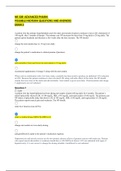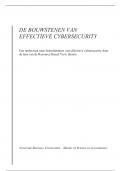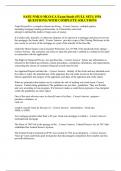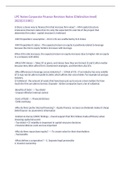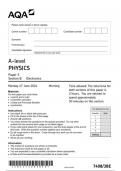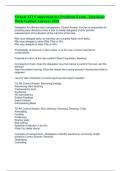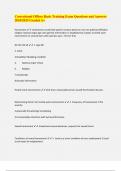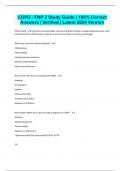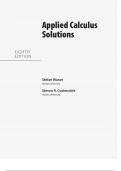(CORRECT ANSWERS )
SEMESTER 2 20224
GUARANTEED DISTINCTION.
1. Do you agree with the statement that “certain psychometric testing practices can be interpreted as
falling under the definition of an unfair labour practice”, and why? (3)
Psychometric testing practices can indeed be interpreted as falling under the definition of an unfair
labor practice in certain circumstances. This can occur when the testing practices result in
discrimination, bias, or unfair treatment of employees or job applicants.
Discrimination and Bias
Psychometric tests may inadvertently discriminate against certain groups based on factors such as race,
gender, or disability. If the tests are not validated or designed to be fair and unbiased, they can lead to
unfair treatment of individuals from these groups.
Lack of Job-Relatedness
If the psychometric tests are not directly related to the requirements of the job, they may be considered
an unfair labor practice. Testing practices should be job-related and consistent with business necessity
to avoid being seen as discriminatory or unfair.
, The concept of unfair labour practice has been introduced into South Africa through the Labour
Relations Act and it is argued that certain psychometric testing practices can be interpreted as falling
under the definition of an unfair labour practice. Empirical results are presented indicating that
different ethnic groups obtain significantly different mean ability test scores. A case study is cited to
show that this would result in an underprediction of performance on a criterion for the lower scoring
of two groups if test scores are regarded as comparable. It is argued that any interpretation of
psychometric data in South Africa that does not take into account of possible differences between
ethnic groups is likely to ignore a significant moderator variable, given the history of ethnically based
discriminatory practices in this country. Arguments based on meta-analytical research in the USA, to
the effect that psychometric ability tests do not discriminate unfairly against disadvantaged groups if
the same tests and norms are used, should not be assumed to hold in South Africa. Various
conceptions of what constitutes fairness in selection are considered, and it is concluded that there is a
need for employers to make explicit in their selection policies the trade-off between economic and
social costs of employment practices. Finally, some implications for users of psychometric tests in
industry are considered, to forewarn of likely developments in this field.
1. Do you agree with the statement that “certain psychometric testing practices can be interpreted as
falling under the definition of an unfair labour practice”, and why? (3)
Psychometric testing practices can indeed be interpreted as falling under the definition of an unfair
labor practice in certain circumstances. This can occur when the testing practices result in
discrimination, bias, or unfair treatment of employees or job applicants.
Discrimination and Bias
Psychometric tests may inadvertently discriminate against certain groups based on factors such as race,
gender, or disability. If the tests are not validated or designed to be fair and unbiased, they can lead to
unfair treatment of individuals from these groups.
Lack of Job-Relatedness
If the psychometric tests are not directly related to the requirements of the job, they may be considered
an unfair labor practice. Testing practices should be job-related and consistent with business necessity
to avoid being seen as discriminatory or unfair.
Violation of Privacy
In some cases, psychometric testing practices may infringe on the privacy rights of employees or job
applicants. This can be seen as an unfair labor practice, especially if the tests delve into personal or
sensitive information unrelated to job performance.
In conclusion, while psychometric testing can be a valuable tool for assessing candidates, it is essential
to ensure that these practices are fair, unbiased, and directly related to the requirements of the job.
Failure to do so can lead to interpretations of unfair labor practices

